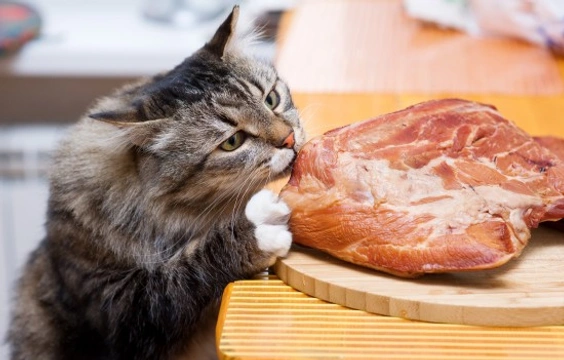
The Importance of Taurine in a Cat's Diet
Up until the late eighties many cats were prone to renal health issues which often proved to be fatal. However, after a lot of research, it came to light these feline health issues and in particularly a condition known as Dilated Cardiomyopathy, were due to a deficiency of an essential feline amino acid called taurine.
However, cats with a taurine deficiency were also prone to eye problems often leading to blindness. Since this discovery, pet food manufacturers started to include a supplement of taurine in all the cat food that's mass produced even though good quality commercially produced already contained some levels of taurine. With this said, raw meat too contains taurine which means feeding a cat good quality fresh raw meat will supply this valuable essential amino acid to a cat so they remain in good health.
Taurine : The Essential Feline Amino Acid
The benefits of supplementing a cat's diet with taurine helps maintain good all round health, and it does so in various ways. The two most important being to protect against the deterioration of a cat's retinas and to ensure correct function of a cat's heart muscles.
Without the correct levels of taurine in their diets, cats may be prone to suffer from a life-threatening heart condition. Dilated Cardiomyopathy can be fatal due to the fact the heart's ventricular chambers fail to pump blood efficiently through it. This leads to a build-up of blood within the heart which can result in heart failure.
Once thought of as an incurable heart condition, it can now be reversed by simply introducing a taurine supplement into a cats diet, thereby saving their lives. However, the condition needs to be diagnosed early and the supplement given in the early stages of the condition for taurine to be an effective cure for Dilated Cardiomyopathy.
Cats also need the right levels of taurine in order to maintain their correct body weight, liver and muscle function as well as their blood sugar levels. Taurine is also a valuable amino acid that helps maintain a cat's teeth and coat. Pregnant females need to have the correct amounts of it to avoid suffering from any health issues which includes abortion. It also prevents the risk of birth defects in her unborn kittens.
How Much Taurine Do Cats Need to Stay Healthy?
A healthy, normal growing cat needs at least 400 mg of taurine per kg of body weight per day. A mature cat needs slightly more, 500 mg per kilo of body weight is the recommended amount.
The Symptoms of Taurine Deficiency to Look Out For
The onset of taurine deficiency can be slow and only develops over time. As such the symptoms tend to be subtle and quite hard to spot. However, the things to look out for are as follows:
- Shortness of breath
- Loss of appetite
- Lethargy
- Poor vision
- Rough looking coat
- Dental problems
- Poor growth
If you are concerned your cat is showing any of the symptoms mentioned above, it might be worth discussing the problem with your vet who would advise whether or not you should supplement your cat's diet with taurine. Sometimes, the supplement can be discontinued after a few months if the symptoms subside. However, in some instances cats need to be given the supplement for the rest of their lives in order to remain healthy and happy.
Ways to Provide a Taurine Supplement to a Cat
Inadequate levels of taurine in a cats diet only became evident and therefore a concern in the late eighties. At that time the condition known as Dilated Cardiomyopathy was a very common ailment amongst cats and all too often the condition proved to be fatal.
It was then commercial pet foods manufacturers began to include adequate levels of taurine in the cat food they produced, sometimes even adding more than was really necessary for cats to remain healthy. However, if you think your cat may be deficient in taurine, you would need to discuss the situation with your vet in order to have them prescribe the correct supplementation to be added to their diet.
If you choose to create a balanced diet for your cat that does not include commercially produced cat food, then you would need to ensure the right level of taurine is included. Good quality raw meat does contain good levels of taurine. However, when meat is cooked, the level decreases dramatically. One thing to bear in mind is that cats cannot survive and thrive on a strictly vegetarian diet due to the fact they need taurine which can only be provided in meat.
The thing to bear in mind is that cats rarely suffer from a taurine “overdose” simply because they are incapable of storing this particular amino acid either in their body fat or other fatty tissues. If too much of the supplement is given to a cat their bodies excrete the excess out.
Always check the labels of any commercially produced cat food you feed your feline friend to make sure there is enough taurine included in it. If possible you should try to feed your cat some good quality fresh raw meat from time to time because this is one of the best sources of taurines and your cat will love the treat!
Feeding Your Cat a Raw Meat Diet Only
Alternatively, you might want to consider feeding your cat a fresh meat diet and not include any commercially manufactured cat food. As long as the meat is fed to your cat raw, they will get the right level of taurine in their diet. You should not cook the meat because this will decrease the level of taurine the meat contains. You would then have to add a taurine supplement to your pet's diet for them to remain happy and healthy.



